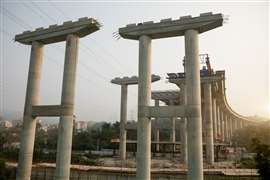Read this article in French German Italian Portuguese Spanish
US$1.5 trillion growth at risk from delayed megaprojects
03 July 2025
Over 10% of mega and giga-projects and programmes around the world are at risk of significant delay or cancellation, according to a new report published by Mace.
 As construction projects grow in size and scope so does the risk of delay. Image: Adobe Stock
As construction projects grow in size and scope so does the risk of delay. Image: Adobe Stock
The report, which analyses over 5,000 mega and giga-projects, estimates these inefficiencies will mean the global economy is at risk of missing out on more than US$1.5 trillion of economic growth by 2030 due to delayed megaproject delivery.
The Future of Major Programme Delivery report examines different approaches to delivery and suggests actionable solutions centring around more collaborative models, including being more outcomes focused, having a ‘one team’ approach and sharing risk and reward.
It also suggests taking more time up-front to ensure readiness, defining and agreeing good governance, having a clear scope definition and cost realism.
The commissioning of major programmes, whether for energy, high-speed rail, hospitals or homes, schools or flood defences, as the climate changes and as urbanisation continues, has resulted in the number increasing by 280% since 2010.
Dominated by the US, with 1,663 projects announced since 2010, and driven by countries such as India (729), Saudi Arabia (577) and the UK (484), data from the report shows programmes are becoming larger, more complex and more expensive. Driven in part by political support and public investment, the top ten live global projects looked at have a combined total value of US$685 billion.
“When large-scale programmes are significantly delayed and go over budget, the focus on the positive impact they have is diluted. When major programmes exist to deliver beneficial outcomes for society, it’s a factor that needs to be addressed,” comments Davendra Dabasia, CEO for Mace Consult.
“Many of the issues are systemic, often driven by national politics and policies, and reflect the challenging ecosystem that delivery takes place in. As major projects and programmes become larger and more complex, delivery models need to be agile to tackle challenges and capitalise on any new opportunities.”
The report highlights that collaborative approaches result in a 4%-13% reduction in cost and a 50% reduction in the risk of projects being delivered late.
STAY CONNECTED



Receive the information you need when you need it through our world-leading magazines, newsletters and daily briefings.
CONNECT WITH THE TEAM








